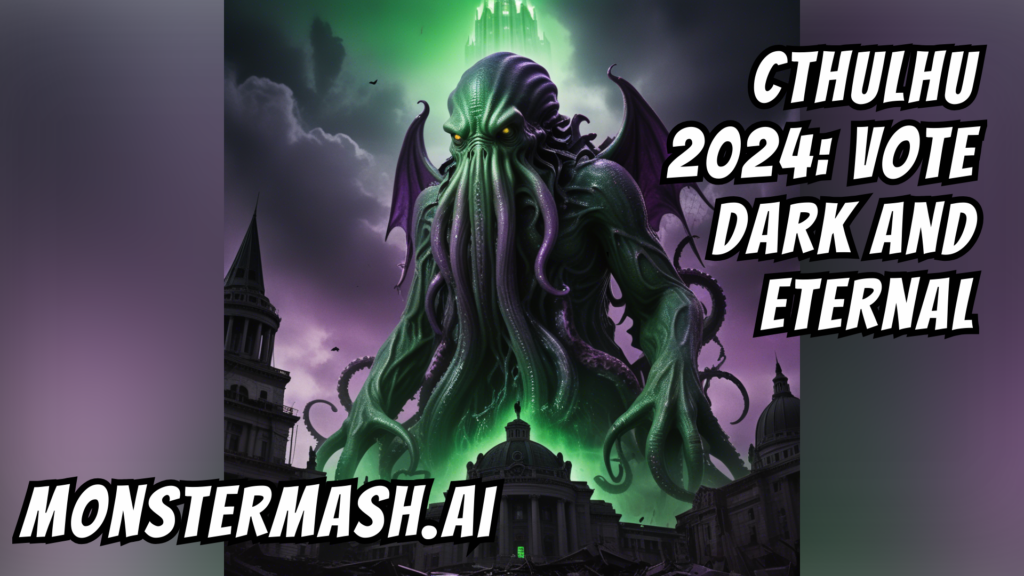Why Vote for Cthulhu in 2024? A Dive into Cosmic Power and Lovecraftian Influence
As the 2024 elections approach, the air is filled with promises, slogans, and aspirations. Yet, in a twist of cosmic fate, an ancient candidate steps forward from the depths—the Great Old One himself, Cthulhu. In the song “Vote Cthulhu,” we’re given a perspective on this otherworldly candidate, challenging the limits of human politics by offering a vision that taps into the fear, mystery, and allure of cosmic horror. This fictional campaign draws on the works of H.P. Lovecraft, the mind behind Cthulhu, and the larger Lovecraft Mythos, which has long explored the nature of power, fear, and the cosmic unknown.
Who is Cthulhu? A Background on Lovecraft and His Creation
Created by H.P. Lovecraft in the short story “The Call of Cthulhu” (1928), Cthulhu is a powerful and terrifying being—a cosmic entity with tentacles, wings, and a vast, unfathomable intellect. Lovecraft, often considered the master of cosmic horror, introduced readers to beings whose existence alone threatened the sanity of mankind. Cthulhu represents more than just fear; it embodies the terror of insignificance and the powerlessness of humanity in the face of the universe’s unknowns. In this, Cthulhu is the perfect symbol of forces beyond human comprehension—forces that have no concern for human aspirations, politics, or ideals.
Lovecraft’s works have created an expansive mythology now known as the Lovecraft Mythos. This Mythos includes ancient gods, otherworldly beings, and cosmic horrors beyond human understanding. It poses a fascinating question: what if such beings, indifferent to humanity, held true power over our world? Cthulhu’s entry into the political arena, as described in the song, seems almost inevitable, a parody that asks whether human politics has any true substance at all in the shadow of cosmic truths.
Why Vote for Cthulhu? A Critique of Mortal Leaders
The lyrics of “Vote Cthulhu” pit the Great Old One against current political figures, specifically pointing out the perceived failings of Donald Trump and Kamala Harris. Trump is painted as someone clinging to the past, a “salesman” with hollow promises embodied by his “towers, old and high.” Meanwhile, Harris is depicted as a polished speaker whose “words are hollow” and who offers nothing more than “mortal harms.” In comparison, Cthulhu represents a vast and eternal power, unaffected by human biases, ambitions, or frailties.
Cthulhu’s platform is simple: he doesn’t pretend to understand humanity’s politics. Rather, he offers a “cosmic reign,” a governance that goes beyond human concerns, petty quarrels, and societal divides. He embodies the Lovecraftian ideal that human existence and its struggles are ultimately insignificant on a cosmic scale, something often highlighted in the Mythos. The campaign invites us to ponder whether any mortal leader can truly effect meaningful change or if the idea of leadership itself is a comforting illusion.
Cthulhu vs. Democracy: A Cosmic Critique
In the song’s bridge, the lyrics state: “Democracy—a weak illusion, Built on words, mere confusion.” This line speaks to one of Lovecraft’s core themes: the vulnerability of human constructs. In Lovecraft’s world, knowledge and discovery often lead to madness, as human understanding is limited and cannot withstand cosmic truths. The idea of “democracy” is painted as one such fragile construct—a social contract based on ideals and words, which would crumble under the weight of the realities Lovecraftian beings bring with them.
Cthulhu’s candidacy offers an “eternal, timeless hand” and promises power that “never degrades.” This promise is a satire of human politics but also a reflection of Lovecraftian horror, where ancient beings like Cthulhu possess an authority that dwarfs any human concept of governance. In Lovecraft’s works, characters often succumb to their own fear and insignificance when faced with the incomprehensible power of such beings. This “campaign” challenges us to consider the nature of power itself, hinting at the absurdity of human politics when viewed from a cosmic perspective.
The Lovecraftian Campaign Promise: Order Through Chaos
The lyrics also present Cthulhu as an embodiment of chaos and peace. “I am chaos, and I bring peace,” Cthulhu states, revealing an intriguing contradiction that’s central to the Lovecraft Mythos. Lovecraft’s cosmic beings are indifferent to human concerns and motivations; their very existence is chaotic. Yet, in this chaos, there is an inherent order—a natural balance that human society, with all its laws and governance, cannot achieve.
Cthulhu’s campaign points out the futility of building structures on weak foundations, promising a new order built on ancient, inhuman truths. When the lyrics say, “Vote Cthulhu, darkly true, not the empty promises they pursue,” they capture the Lovecraftian theme that sometimes truth is a terrifying, unknowable force. Cthulhu’s truth isn’t a campaign promise; it’s a cosmic inevitability, one that dismisses the fleeting nature of human leadership.
The Final Vote: Embrace or Fear the Cosmic Unknown?
Ultimately, the lyrics suggest that Cthulhu’s reign is not about promises or progress but about confronting humanity’s limits. To vote for Cthulhu is to accept the unknown and embrace the terrifying beauty of the cosmic order. With phrases like “Cast your vote, a step to fate, choose power beyond mortal state,” the song dares listeners to reject comfortable illusions and embrace the terrifying truth at the heart of Lovecraft’s work—that humanity is small, its ambitions fragile, and its leaders powerless before the eternal cosmos.
Why Cthulhu’s Campaign Resonates Today
In an era filled with promises of change, reform, and progress, Cthulhu’s candidacy reminds us that power isn’t always what it seems. The “Vote Cthulhu” song uses dark humor to critique human politics, emphasizing Lovecraft’s message that true power is often unknowable, incomprehensible, and frightening. Lovecraft’s Cthulhu Mythos has long asked readers to consider the nature of existence beyond human understanding. With a platform rooted in eternal truth rather than fleeting ambitions, Cthulhu offers a perspective that is both terrifying and oddly refreshing—an invitation to step beyond the confines of human politics and into the mysteries of the cosmos.
Final Thoughts
While fictional, a Cthulhu candidacy challenges us to reflect on the very nature of leadership, truth, and human limitations. Lovecraft’s enduring influence on horror and philosophical thought shines through, as “Vote Cthulhu” brings his themes to life in an era when cosmic indifference feels more relatable than ever. So as we look to our leaders for guidance, let’s not forget the darkly humorous message of this song: sometimes, the most powerful forces are the ones we can’t—and perhaps shouldn’t—comprehend.


